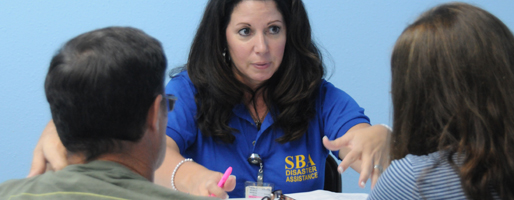This information applies to SBA disaster loans for Homeowner Associations (HOA), Planned Unit Developments (PUD), co-ops, condominium and other common interest developments.
Types of Disaster Loans Available to Qualified Applicants
SBA disaster business loans of up to $2 million are available to associations to repair or replace disaster-damaged common elements not fully covered by insurance or other disaster recoveries.
If the development will not be repaired or rebuilt, the Association is not eligible for any SBA disaster assistance. However, unit owners may still apply to SBA for assistance.
Use of Loans
SBA disaster loans must be used only to pay for disaster-related repairs. They cannot be used to pay for deferred maintenance items or any upgrades to the property, unless such upgrades are code required.
Collateral
All disaster loans over $14,000 require collateral, generally real estate, if it is available. SBA also requires the Association to levy a monthly assessment against each unit owner. SBA will take an assignment of this assessment as collateral.
What We Need To Process The Application
-
A completed Disaster Business Loan Application (SBA Form 5).
-
A completed Tax Information Authorization (IRS Form 8821), and the latest nonprofit tax returns filed with the IRS, if available. If not available, copies of the latest operating budgets are required.
-
A copy of all articles of incorporation, by-laws, and any other governing documents of the Association, including conditions, covenants, and restrictions (CC&Rs).
-
A complete list of all owners and directors including their mailing address and the address of their disaster-damaged property, if different.
-
Documentation of insurance coverage and a description of any litigation initiated due to the disaster.
NOTE: If the Association owns the common areas, we may need a deed to those areas at a later date. Even if the Association chooses not to apply for a loan, SBA will still need items 3 through 5 to process applications for assistance from individual unit owners.
Funding the Repairs
The total loan amount to the Association for common area repairs, including any assessment amounts to the unit owners that have been paid through an SBA disaster loan, cannot exceed SBA’s $2 million loan limit.
If the Association’s damage to the common area exceeds SBA’s $2 million lending limit, the Association may pass a onetime assessment against the unit owners to cover the remaining costs in excess of the Association’s SBA loan. The Association may also pass a onetime assessment to the unit owners to cover all the damages in lieu of applying to SBA for a loan.
The Association may borrow funds from SBA to cover insurance deductibles or shortages in an existing maintenance fund.
Mitigation
SBA disaster loans can be increased by up to 20% of the total amount of disaster damage to real estate and/or leasehold improvements, as verified by SBA to pay for elective upgrades to prevent future disaster damage from a similar disaster, provided the total does not exceed $2 million.
Special Requirements
Before SBA will disburse any loan funds, we must have confirmation that all the money necessary to complete the repairs is available. Therefore, we must have documentation supporting the total project cost of the repairs and the amount of anticipated insurance recoveries. The damages to the common areas must be clearly separated from the damage to the individual units to establish eligibility.
For additional information, please contact our Customer Service Center. Call 1-800-659-2955 (TTY: 1-800-877-8339) or e-maildisastercustomerservice@sba.gov.

